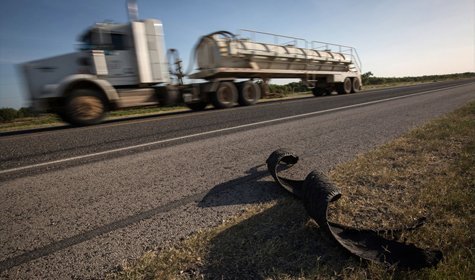by Bobby Blanchard,
South Texas counties scrambling for money to repair roads damaged by heavy trucks carrying oil field equipment have run into a roadblock: the state itself.
Officials in many of the counties hoped to lease mineral rights beneath county roads and rights of way to energy companies, and use the revenue to repair those roads. But a 54-year-old opinion from the attorney general’s office gives leasing rights, and the revenue, to the state. That does not sit well with some county judges.
 If counties have to repair and maintain the roads, they deserve some of the royalties from mineral rights under and around them, said DeWitt County Judge Daryl Fowler. From January 2011 to April 2014, leases on DeWitt County property negotiated by the state’s General Land Office raised more than $8 million, all of which went to the state general fund, Fowler said. During that time, DeWitt County’s road budget grew from $2.5 million to $15.3 million.
If counties have to repair and maintain the roads, they deserve some of the royalties from mineral rights under and around them, said DeWitt County Judge Daryl Fowler. From January 2011 to April 2014, leases on DeWitt County property negotiated by the state’s General Land Office raised more than $8 million, all of which went to the state general fund, Fowler said. During that time, DeWitt County’s road budget grew from $2.5 million to $15.3 million.
“We still have to maintain the roads, and in many cases we’re rebuilding the roads,” Fowler said. “The state is actually benefiting from the revenue stream. We’re paying for the maintenance, but we’re not getting any benefit from the production. Somebody is eating a free lunch.”
Fowler and representatives from other counties will ask the next Legislature to allow counties to negotiate leases, or at least receive some of the money the state gets from leasing mineral rights around roads. Counties can already negotiate leases for mineral rights under buildings they own, such as courthouses.
“We would like legislation that returns that revenue stream to the county, and allows us to use it to offset the damages,” Fowler said. “To have this attorney general’s opinion to say we’re not entitled is a real stretch.”
DeWitt County is one of 30 counties in the Eagle Ford Shale in South Texas, where the oil and gas boom has drawn new residents and generated revenue for the state, but also damaged roads never meant to carry 18-wheel trucks.
“Our road system is wholly inadequate for what is going on in the Eagle Ford Shale,” Fowler said. “We’re doing what we can with the revenue that we have.”
It would cost more than $400 million to repair and upgrade more than 300 miles of roads in DeWitt County, according to a 2012 report by an engineering firm hired by the county.
Legislation on the issue never made it out of committee last session. State Rep. Garnet Coleman, D-Houston, chairman of the House County Affairs Committee, said he supports helping the counties.
“It’s important to get this right,” said Coleman, who added that the issue had a better chance in the next session because lawmakers are better educated about it.
The 1960 opinion by then-Attorney General Will Wilson is consistent with a convention in Texas and other states that roadways are the state’s business, said Matthew Festa, a professor at the South Texas College of Law and an expert in property laws.
“It would take some creative drafting to come up with a law that provides an exception to this rule against counties negotiating a lease without undermining the larger framework of the state’s essential sovereignty over the roadways,” Festa said.
A spokesman for Attorney General Greg Abbott, the governor-elect, declined to comment on the 1960 opinion.
Jerry Patterson, the state’s departing land commissioner, said the land office should continue negotiating the leases. But he said he did not see a problem with money generated by the leases going to the counties.
Fowler said he did not care whether the counties or the state negotiated the leases. He just wants the counties to get a piece of the pie.
This article originally appeared in The Texas Tribune at http://www.texastribune.org/2014/12/22/old-ruling-keeps-counties-mineral-rights/.


:quality(75)/https://static.texastribune.org/media/files/aa1a9269813ee795bc63961f900ebfbb/0502%20Lufkin%20TxDot.jpeg?w=440&resize=440,264&ssl=1)
:quality(75)/https://static.texastribune.org/media/files/1dfc50f37e68906f2795d2367ea2e18d/TxDOT%20Flooding%20E%20TX%20TT%2001.jpg?w=440&resize=440,264&ssl=1)

:quality(75)/https://static.texastribune.org/media/files/fd00248f901ee5091236eb0fa0473743/DPS%20Texas%20Capitol%20MG%20TT%2010.jpg?w=440&resize=440,264&ssl=1)
